by Michael | Oct 28, 2013 | Blog
Regular readers of my blogs will know that I write and conduct personalised life-cycle ceremonies. Not just weddings, civil partnerships, vow renewals, ring blessings, baby-namings and the like, but also funerals.
Cheerful as my blogs tend to be, this one will consider an aspect of death: what do you want to happen to your body at the end?
Of course, this is something I discuss with people (and their families) in their lifetime; I then write the service and eulogy that they actually want.
It’s no more ghoulish than writing a will, and it’s certainly as practical. You’re simply ensuring that your wishes are carried out when you’re no longer around to control things.
Choices
Most people think that a funeral is prescribed. But the only things that actually need to be done when there is a death are legal registration and disposal of the body. Although there are certain stipulations, there is a surprising choice of methods open to you.
The Conventional
Conventionally, you have a religious service delivered by your church, synagogue, temple etc. This will often entail burial, but increasingly nowadays, cremation, and the minister will usually conduct a prescribed service that allows little individuality.
Alternatives
Independent Celebrants
More and more, for those who do not want a full religious service (whether out of respect for the deceased or as the family’s choice) , there is the possibility of a unique, tailor-made service conducted by an independent celebrant. Funeral Directors frequently can recommend such an officiant. The celebrant should visit the next-of-kin and discuss the family’s wishes and learn about the deceased, so as to be able to write an appropriate celebratory service, approved beforehand by the family, and conduct it on the day.
These services are often held in crematoria, but they can take place in cemeteries or natural burial grounds, or even in homes as memorial services.
DIY
There is no space to go into this here, but, as long as pollution and health and safety laws are followed, you can bury someone in your back garden and conduct the ceremony yourself. I don’t recommend it, but, as I have said, there is some freedom as to how – or whether – you conduct a funeral.
Modern alternatives
Wear your beloved!
When your loved one has died, it is possible for their cremated remains (which contain a lot of carbon) to be transformed into precious stones, including diamonds. So your loved one, in the form of a ring or necklace, can still be with you wherever you go!
Give your beloved a real send-off!
Your loved one’s ashes can be sent off into the earth’s orbit or, for quite a price, launched into outer space. I’m not sure about the ‘carbon footprint’ here, but it IS an option …
Become an atoll!
Ashes can be cast into a 100% natural cast reef mould, lowered into the ocean to eventually become a coral reef. Environmentally-friendly and a creative (if expensive?) idea.
All at sea
You can be buried at sea, as in a garden – see above – but there are regulations you need to conform to.
Resomation
Another more environmentally-friendly suggestion is resomation, which is a water-based process which reduces the body to soft bone, easily crumbled. The bone powder can be treated in the same way as cremated remains.
Cryomation
This process uses liquid nitrogen to freeze the body, which is then fragmented, freeze-dried and rendered rapidly compostable in a shallow burial. This must be the greenest process of all.
Cryogenic freezing
Finally, human remains can be frozen, using liquid nitrogen, without damaging human tissue. In theory, the body will be preserved until, with advances in medical knowledge, it will be able to be treated and eventually reanimated.
Take your pick!!
Michael Gordon can help prepare and conduct a tailor-made life-cycle ceremony in or around London or, indeed, in Europe.
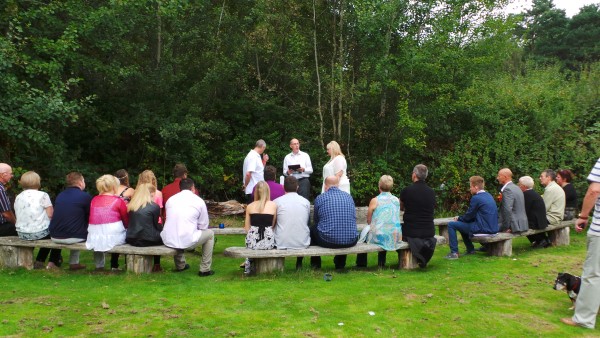
by Michael | Aug 20, 2013 | Blog
A wedding planner can ensure peace of mind, doing everything for you (at a cost). You may, however, decide you’d rather not go down that route, so here are a few tips to bear in mind.
I’m going to confine myself to a civil celebrant-led ceremony, rather than discuss a prescribed church service or merely a registry office ceremony. If you want the full church works, then of course your priest will be able to give you all the advice you need. A registry office ceremony may well be brief but will be standardised and not personal.
First things first
Whatever you do, possibly even before you book your venue, you will need to formally give notice (together and in person) of marriage/civil partnership and book the registrar.
Registrar
An excellent plan, if you are having a civil ceremony, and wish to choose a venue that is not actually licensed for weddings, is to go down to the Registry Office (make an appointment first!) the morning or day before, in your ordinary clothes and with two witnesses. At that point you get legally married, but can then enjoy exactly the ceremony you want in the afternoon (free of anxiety). You can even sign a certificate (not legally binding) for that photo-opportunity for your guests!
However, if you are marrying in licensed premises, a registrar will still need to be present (and, therefore, pre-booked).
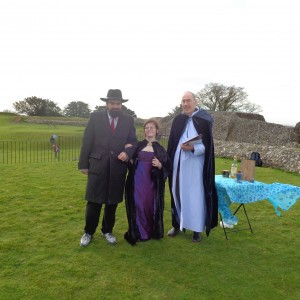
Venue
It is up to you whether you choose a licensed venue or, for example, the great outdoors, as long as you bear the above paragraph in mind. If you are planning to use private land, ensure you ask permission first!
Preliminaries
It is beyond the scope of this article to go into each element here in depth, but, depending on the scale of your ceremony, some of the things you will need to consider – in good time – are:
- Dress
- Catering
- Guest list
- Invitations
- Flowers
- Seating plan
- Transport
- Order of service booklet
- Entertainment
- Potential accommodation for you and/or guests
- Officiant
And, not least, the content of the wedding service itself.
The Wedding Ceremony
Do you want the traditional bits? Or just some of them? Do you prefer a modern service? Do you want hymns? What music do you want? Who will participate (eg as reader(s))? Who should walk down the aisle? What about including some less orthodox rituals (handfasting, Unity candles, etc.)?
A lot of questions! But these are all things that the civil celebrant should be able to advise you on. They will construct the ceremony with you and you will approve every bit of it along the way, so that you (and, your guests) will enjoy a unique, personalised, tailor-made ceremony.
Like the sound of that? Given time, you can organise all this yourself quite successfully, save money, and still have the memorable, delightful ceremony of your dreams.
by Michael | Jul 9, 2013 | Blog
OK, so the title is a poor play on words, but understanding the tax implications of marriage can prove very important.
Proposed tax break
I am a civil celebrant, not a tax expert, but I think I have my facts right. A new marriage tax break is on its way in, but actually it will only really benefit couples if one is a 20% tax payer and the other is bringing in less than £9,250 a year. Even then, the benefit will amount to only £150. So don’t rely on this to reimburse you for the wedding expenses!
However, there are other ways where it can be financially advantageous to be married.
Inheritance tax
This tax is charged on estates worth £325,000 or more. If you are married, or in a civil partnership, all assets can be passed wholly and freely to the surviving partner.
When the second partner dies, the allowances for each of them apply (together), so heirs can receive £650,000 before the tax comes into force.
Income tax
Income tax paid on savings, investments or a rental property can be reduced, if one spouse pays a lower rate of tax than the other. So assets can be switched, so that the lower-earner owns them (as long as the interest concerned is not more than the personal allowance).
Note that this is not permitted for unmarried couples.
Capital gains tax
If you are selling assets (eg funds, shares, property), each of you is taxed on any gain over £10,900. A couple can realise gains of £21,800 before the tax is applied.
Pensions
If married, you can inherit any final salary pension that your spouse earned. (This does not apply, if you are merely co-habiting.) Civil partners have the same rights as married spouses, incidentally.
Conclusion
I acknowledge that this may not have been the most riveting blog I have ever written, but I believe it addresses an important area, and I hope that anyone who has remained awake thus far will have gained something from it!
Michael Gordon can help prepare and conduct a tailor-made civil ceremony in or around London or, indeed, in Europe.
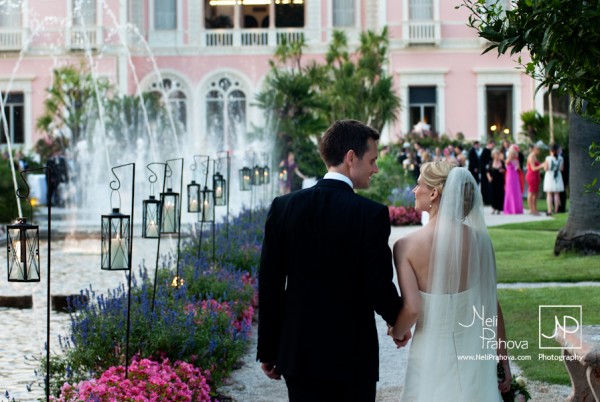
by Michael | Jun 20, 2013 | Blog
Getting married in a church is no longer de rigueur, of course. For those seeking alternatives, there are other routes to choose from.
The Registry Office
A registry office can be an option, especially for those who want a ceremony devoid of any religious content. And anybody not getting married in a C of E church, will need a certificate from a registrar to make the wedding legal.
Incidentally, it’s normally fine to arrange for a Church blessing after the registry ceremony.
The ‘wedding’ ceremony is quite short and to the point (around 20 minutes long), but is not likely to be particularly memorable or special. But if that’s all you want, then that’s fine.
Note that you have to register at your local Registry Office a year before the event (although you can be married at another Registry Office). One of you must attend in person, and there is a fee to be paid.
For the certificate, two adult witnesses to the marriage will be required.
Civil Partnerships
A same-sex couple can register in a registry office (or approved premises) as civil partners. Notice has to be given, and this will be publicized for 15 days, after which the event can take place. (The period of validity for the notice is one year.)
Licensed venues
Choosing the location for your marriage is becoming increasingly popular. If you use a licensed venue, you will still need two registrars present at the ceremony (to be booked up to 12 months before the day).
Don’t forget to book the venue well in advance too.

Thanks to www.NeliPrahova.com
‘European style’ weddings
If you want to use an unlicensed venue (and that can include the sea shore, a mountain top, a palace, or wherever your imagination takes you – but do seek the landowner’s permission first!), that’s OK. You can go to the registry office in your jeans with two witnesses in the morning, say, and have the legal side taken care of. You don’t even need to exchange rings there.
Then in the afternoon, or a day or two later, you can relax and enjoy your unique ceremony along with your guests.
A unique ceremony
Nowadays, a (non-legal) wedding ceremony, whether for a straight or a gay couple, may be conducted by a civil celebrant, who will also help you write the whole service. You have freedom of wording, music, poems, rituals or, possibly, theme, and your celebrant will be with you to advise and make suggestions, so that the day is absolutely tailor-made for you.
Celebrants of various sorts can be found. Humanists will not have any religious content at all in their ceremonies. Others will allow you as much or as little as you want. The Interfaith Foundation can help. Organisations like the ARC or FOIC can help too and can direct you to a local civil celebrant.
As a FOIC member, I would be happy to answer any questions you may have.
Michael Gordon can help prepare and conduct a tailor-made civil ceremony in or around London or, indeed, in Europe.
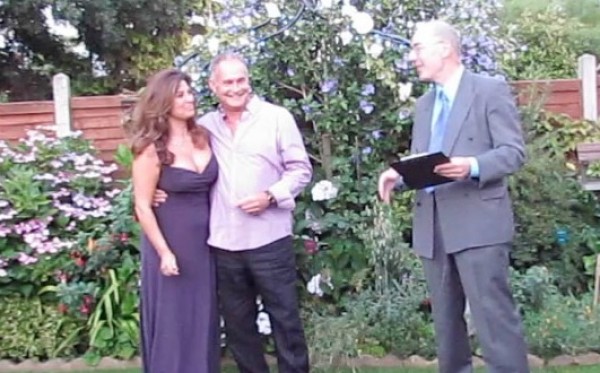
by Michael | Apr 30, 2013 | Blog
What’s the point of having an at-home ceremony?
Just book a restaurant, hotel, hot-air balloon, or whatever, for your wedding, vow renewal, handfasting or baby-naming.
You can usually rely on the venue to supply what you have agreed, even though things don’t always run smoothly (when do they?!). But, of course, there is the financial implication to consider.
It can be cheaper to organise an at-home ceremony, although not necessarily.
If you have the wherewithal to do this, do bear in mind that you will need to plan what you’re doing very carefully. However, a home ceremony may yurn out a lot more relaxed, informal and comforting.
Here are some suggestions to make it as stress-free as possible.
Celebrant
As they arrive, it can be nice to introduce those taking part in the ceremony to the celebrant. The celebrant is not there to be an usher or to welcome guests, but these introductions can help put people at their ease.
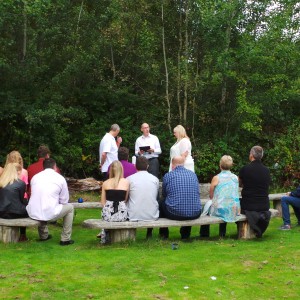
The venue
Even if you are planning to hold the ceremony outdoors, it pays to have a room available indoors which can comfortably accommodate all the guests, if the weather lets you down.
For an outdoor ceremony, do ensure there are enough chairs (on an even surface) for all the guests. The celebrant will probably want a table, possibly two chairs (the couple may be signing their ceremony certificate) and maybe a paperweight or two. A jug of water plus three glasses would be appreciated, especially in warm weather.
Layout
Obviously, take health & safety into consideration. There needs to be space for people to move around reasonably comfortably, and, potentially, wheelchair access. You won’t want electric cables all over the place to be tripped over, or marquees toppling over in the wind. Make sure all is ready well before the ceremony is due to start. (It is not the celebrant’s job to be moving furniture!)
Distractions
Hopefully, guest behaviour will not be an issue, but I would counsel against serving alcohol before the ceremony.
- If you have domestic animals that could interfere with the ceremony, please ensure that they are shut away.
- If you can, arrange it that your neighbour does not mow the lawn just when the ceremony is taking place, or that he doesn’t leave his dogs at home howling.
- If it is likely to be very hot, try and arrange shade or supply guests with soft drinks before the ceremony .
- Some sort of mini-creche might be a wise option if you are inviting a lot of small children.
Insurance
Do ensure that your domestic insurance policy covers third party liability for any visitors to your home.
Nobody said it was a simple matter to arrange a ceremony at home! However, the rewards can be fantastic. Good luck!
Michael Gordon is a celebrant based in London.





